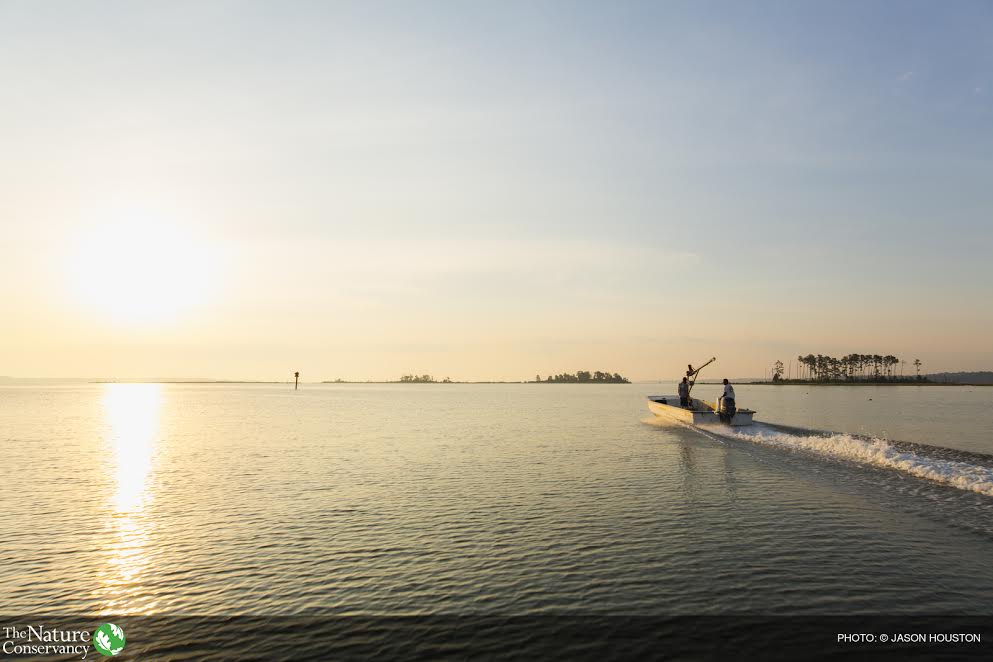
Nature Conservancy gets feet wet in aquaculture
December 7, 2016
By Ruby Gonzalez
 A pilot project in Chesapeake Bay focuses on “blue growth in aquaculture that maximizes benefits and minimizes impacts”
A pilot project in Chesapeake Bay focuses on “blue growth in aquaculture that maximizes benefits and minimizes impacts”
The Nature Conservancy (TNC) has embarked on global aquaculture projects with a mission to maximize yield while minimizing environmental impacts. The environmental NGO will launch three new pilot projects in 2017 in the Chesapeake Bay, Belize and Indonesia.
TNC’s foray into aquaculture provides the group with “a big opportunity to make a difference,” considering that there are very few global NGOs in this field.
“The Conservancy is committed to encouraging blue growth in aquaculture that maximizes benefits and minimizes impacts,” Robert Jones, Global Aquaculture Lead at TNC, told Aquaculture North America (ANA). “When done responsibly, aquaculture provides sustainable seafood and green jobs for coastal communities that need them. However, poorly planned growth and unsustainable practices can have negative environmental consequences.”
Their focus on “restorative aquaculture” complements the 209 marine restoration projects they have undertaken for over 20 years. “Our focus on smart siting for aquaculture builds on our track record of success in marine spatial planning and draws upon our Development by Design framework that we have applied successfully to the hydropower and agriculture sectors,” he said.
The global marine aquaculture strategy focuses on encouraging the growth of shellfish and seaweed aquaculture — what it calls “ecologically restorative aquaculture” — and working with industry and governments to ensure that new aquaculture operations are well-sited to ensure sustainability.
“Shellfish and seaweed require no feed, freshwater or land to produce and are therefore very sustainable. Additionally, shellfish and seaweed farming can provide restorative benefits to coastal ecosystems by helping recover ecosystem functions lost to habitat degradation,” he said.
Siting: Crucial in achieving sustainability
“We believe siting is the first and most critical step to minimize the environmental and social impacts of new aquaculture operations…Improved siting can also help to maximize productivity of operations. We plan to work with partners to refine and apply spatial planning tools and processes to aquaculture siting. We aim to invest in the science and processes that advance zonal and area management approaches in strategic locations where aquaculture is likely to grow. Better planning and siting of aquaculture facilities is a win for nature, business and communities,” he said.
TNC believes in harnessing the strength of the private sector in advancing the work and creating
positive outcomes for both people and nature. Since many shellfish and seaweed operations are already implementing sustainable practices that provide ecosystem benefits, TNC’s advocacy is to encourage use of these operations and promote the benefits of sustainable aquaculture.
“One of the key questions we are investigating is how growing practices and gear types can be modified to maximize these benefits and, if possible, accelerate ecosystem recovery. We are working with shellfish growers, companies and academic partners to develop in-the-water projects to answer this question and apply the results in commercial settings,” Jones said.
TNC is the in the early stages of building a long-term aquaculture program. “It’s a natural progression for us to leverage and apply what we have learned from oyster restoration to shellfish aquaculture,” Jones said, referring to their extensive on-the-ground working experience in US and overseas coastal communities on oyster restoration and science.
Initial projects
In the Chesapeake Bay, TNC will develop a way of visualizing shellfish farming’s restorative benefits on the ecosystem. They will use remotely-operated vehicles and drones to capture images and measure water-quality parameters in order to develop 3D models of water-quality benefits across geographic areas and gear types. The project, which is in partnership with the Virginia Institute of Marine Science, will be working with four Virginia shellfish farms.
The project in Belize is part of a fisheries reform effort. TNC will be working with 10 conch and lobster fishermen and train them on how to grow seaweed as an alternative livelihood option that provides supplemental income to fishing.
The thrust in Indonesia is to increase seaweed farming productivity and minimize its environmental impacts in coastal communities and inform them of the development of future seaweed farms.
—Ruby Gonzalez
Advertisement
- Prototype land-based IMTA system combines best of two concepts
- Study: Escaped salmon from Newfoundland farms interbreeding with wild salmon





